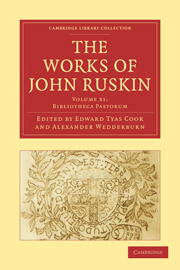Book contents
- Frontmatter
- Contents
- LIST OF ILLUSTRATIONS
- INTRODUCTION TO THIS VOLUME
- “BIBLIOTHECA PASTORUM,” EDITED BY JOHN RUSKIN
- I THE “ECONOMIST” OF XENOPHON. TRANSLATED INTO ENGLISH BY A. WEDDERBURN AND W. G. COLLINGWOOD, WITH A PREFACE BY THE EDITOR (1876)
- II “ROCK HONEYCOMB.” BROKEN PIECES OF SIR PHILIP SIDNEY'S PSALTER. LAID UP IN STORE FOR ENGLISH HOMES. WITH A PREFACE AND COMMENTARY BY THE EDITOR (1877)
- III “ELEMENTS OF ENGLISH PROSODY FOR USE IN ST. GEORGE'S SCHOOLS.” EXPLANATORY OF THE VARIOUS TERMS USED IN “ROCK HONEYCOMB” (1880)
- IV “A KNIGHT'S FAITH.” PASSAGES IN THE LIFE OF SIR HERBERT EDWARDES. COLLATED BY JOHN RUSKIN (1885)
- APPENDIX: SPECIMENS OF RUSKIN'S MUSIC
- Plate section
III - “ELEMENTS OF ENGLISH PROSODY FOR USE IN ST. GEORGE'S SCHOOLS.” EXPLANATORY OF THE VARIOUS TERMS USED IN “ROCK HONEYCOMB” (1880)
Published online by Cambridge University Press: 07 September 2011
- Frontmatter
- Contents
- LIST OF ILLUSTRATIONS
- INTRODUCTION TO THIS VOLUME
- “BIBLIOTHECA PASTORUM,” EDITED BY JOHN RUSKIN
- I THE “ECONOMIST” OF XENOPHON. TRANSLATED INTO ENGLISH BY A. WEDDERBURN AND W. G. COLLINGWOOD, WITH A PREFACE BY THE EDITOR (1876)
- II “ROCK HONEYCOMB.” BROKEN PIECES OF SIR PHILIP SIDNEY'S PSALTER. LAID UP IN STORE FOR ENGLISH HOMES. WITH A PREFACE AND COMMENTARY BY THE EDITOR (1877)
- III “ELEMENTS OF ENGLISH PROSODY FOR USE IN ST. GEORGE'S SCHOOLS.” EXPLANATORY OF THE VARIOUS TERMS USED IN “ROCK HONEYCOMB” (1880)
- IV “A KNIGHT'S FAITH.” PASSAGES IN THE LIFE OF SIR HERBERT EDWARDES. COLLATED BY JOHN RUSKIN (1885)
- APPENDIX: SPECIMENS OF RUSKIN'S MUSIC
- Plate section
Summary
PREFACE
I have never hitherto printed any book falling so far short of what I hoped to make it as this sketch of the system of English Prosody; but I had no conception, when I threw the first notes of it together, what a number of difficult and interesting questions would arise out of the variable conditions of national ear for music, and intention in song. On some of these I have not even touched in the following pages—others are only alluded to; and even the formal arrangement of elementary metre is incomplete: but I cannot delay the long-promised book longer, nor do I think my time would be well spent in endeavouring to follow out the questions it has suggested to myself. I must leave them to better scholars, while I still hope that what is here done by way of introduction to the systematic criticism of English rhythm may be of some use in checking the lawlessness of recent popular versification. I have been, however, chiefly disappointed in finding myself unable to interest any of my musical friends in obtaining more direct correspondence between verbal and harmonic intention. I arranged the examples of verse here chosen on musical lines, hoping that my harmonic friends aforesaid would be good enough either to construct or choose for me passages of pure music which would fit the verses, note to syllable; but I found them all incredulous or disdainful of the propriety of such correspondence, and bent, unanimously, upon establishing a code of abstract sound which should be entirely independent of meaning.
- Type
- Chapter
- Information
- The Works of John Ruskin , pp. 321 - 374Publisher: Cambridge University PressPrint publication year: 2010First published in: 1907



